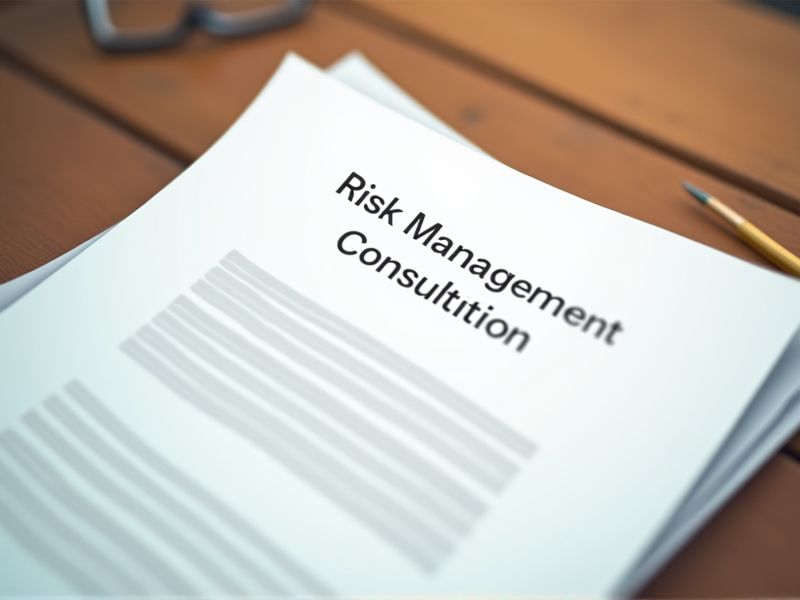
Risk Management Consultants require specific certifications to validate their expertise in identifying and mitigating potential threats to an organization. Certifications ensure that consultants possess the necessary skills and knowledge to implement effective risk management strategies. They also enhance credibility, making clients more likely to trust their judgment and recommendations. Some essential certifications you may need for a Risk Management Consultant role are highlighted below.
Certified Risk Manager (CRM)
A Certified Risk Manager (CRM) designation ensures that a Risk Management Consultant has a comprehensive understanding of risk identification, assessment, and mitigation strategies. This accreditation indicates a rigorous knowledge of industry-standard practices, which enhances the consultant's credibility with clients. The CRM certification equips professionals with skills to develop effective risk solutions tailored to organizational needs. Employers and businesses prefer CRM-certified consultants as they bring disciplined, systematic approaches to managing and minimizing risks.
Certified in Risk and Information Systems Control (CRISC)
Certified in Risk and Information Systems Control (CRISC) enhances a consultant's ability to identify and evaluate IT risk, aligning with organizational objectives. CRISC certification provides a structured approach to managing and mitigating risk, ensuring more effective risk management practices. Possessing CRISC validates a consultant's expertise in designing, implementing, and maintaining information system controls. Clients tend to trust consultants with CRISC due to their proven proficiency in risk assessment and control development.
Financial Risk Manager (FRM)
Financial Risk Managers are essential because they possess expertise in evaluating and mitigating various financial risks such as market, credit, and operational risks, which are crucial for informed decision-making. With their in-depth understanding of financial instruments and regulation, they help organizations align their risk strategies with regulatory requirements. They use quantitative analysis to identify potential threats and vulnerabilities, directly impacting an organization's financial health and stability. Their role supports strategic planning and enhances the resilience of an organization against unforeseen financial downturns.
Professional Risk Manager (PRM)
Professional Risk Manager (PRM) certification equips individuals with a comprehensive understanding of risk management principles, which enhances their expertise in identifying potential risks in consultancy projects. With this credential, consultants can provide well-informed strategies that mitigate financial uncertainties. Hiring a PRM-certified consultant can significantly improve a company's risk management policies, leading to reduced losses. The credibility of a PRM certification can also strengthen a consultant's ability to influence stakeholders effectively on risk-related decisions.
Certified Information Systems Security Professional (CISSP)
Possessing a CISSP certification equips a Risk Management Consultant with standardized knowledge in security systems, ensuring they can assess and mitigate potential risks effectively. Clients often trust consultants with industry-recognized credentials, which translates to better client engagement and assurance in their risk management services. The consortium's rigorous CISSP exam tests expertise across diverse cybersecurity domains, enhancing the consultant's capability to design robust security frameworks. Continuous education requirements for maintaining CISSP certification keep consultants updated on evolving threats and techniques, vital for proactive risk management.
Certified Information Security Manager (CISM)
Risk Management Consultants often encounter complex security challenges that require advanced expertise; obtaining a Certified Information Security Manager (CISM) designation equips them with specialized knowledge in information risk management. Organizations demand comprehensive security strategies, and a CISM-certified consultant can provide authoritative insights into aligning information security with business goals. The certification ensures the consultant possesses a thorough understanding of developing and managing an enterprise-wide information security program. CISM-certified individuals are recognized for their ability to identify and mitigate potential security threats, which is crucial in preventing data breaches and ensuring regulatory compliance.
ISO 31000 Risk Management Certification
Obtaining the ISO 31000 Risk Management Certification provides a standardized framework essential for risk management consultants to ensure they apply globally recognized practices. Clients trust consultants with this certification more because it demonstrates a formal commitment to effective risk management protocols. Certified consultants have a competitive edge in the marketplace, owing to their ability to align risk strategies with international standards. Consistent risk assessment and management following ISO 31000 leads to improved decision-making and resource allocation for organizations.
Project Management Professional (PMP)
Achieving a Project Management Professional (PMP) certification equips a Risk Management Consultant with proven skills in managing complex projects, which enhances their ability to foresee potential risks. The structured methodologies taught in PMP help streamline processes, reducing the likelihood of unforeseen project derailments. With PMP, risk assessments become more precise, leading to better-informed decision-making. Organizations prioritize consultants with PMP credentials as they consistently deliver projects on time, adhering to budget constraints while minimizing risks.
Lean Six Sigma Black Belt
A Lean Six Sigma Black Belt equips a Risk Management Consultant with advanced skills in process improvement, enabling them to identify and mitigate risks more efficiently. Their expertise in data-driven decision-making enhances the consultant's ability to uncover root causes of potential failures, reducing the likelihood of costly errors. Proficiency in statistical analysis allows for more accurate forecasting of risk scenarios, strengthening the consultant's overall risk assessment strategy. Lean Six Sigma methodologies foster a culture of continuous improvement, essential for adapting to ever-changing risk landscapes.
Certified Fraud Examiner (CFE)
Certified Fraud Examiners (CFEs) possess specialized knowledge in fraud detection, crucial for identifying potential financial risks in organizations. Their expertise helps implement effective anti-fraud policies, reducing the likelihood of financial losses. They bring a deep understanding of internal controls, enhancing the risk management framework. CFEs' analytical skills aid in assessing the credibility of financial reports, ensuring accurate risk assessment.
Summary
By obtaining certifications, you enhance your credibility and trust in the field of risk management. Certifications lead to a deeper understanding of risk mitigation strategies, increasing your effectiveness in diverse scenarios. Your certified expertise often commands higher compensation and opens doors to advanced career opportunities. The structured knowledge and updated methodologies from certifications improve decision-making and outcomes in projects.
